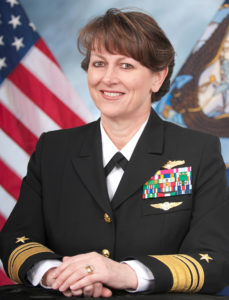Navy looks to onboard sailors with civilian skills at higher pay grades
Navy has asked for legislative permission to start some new sailors' careers at higher ranks. Some with high levels of in-demand skills would potentially start at...
When it comes to building in-demand career fields like cyber, the Navy says it needs more flexibility to recruit civilians who already have the critical skills the service needs without forcing them to start their military careers at the lowest rungs of the pay scale.
In fields like medicine, law and dentistry, the Navy, through its staff corps, already has the ability to bring in trained professionals from the civilian sector and let them immediately start as mid-grade officers. Officials think they need added flexibility to do the same across a broader array of specialized, operational fields as more and more military work roles demand high levels of technical proficiency.

Vice Adm. Jan Tighe, the commander of Navy Fleet Cyber Command, said she began talks with Navy personnel officials one week ago to begin exploring ways to recruit new officers who already have cyber skills, without requiring them to go through traditional military accession pipelines and start as ensigns, the lowest officer pay grade.
“We’re asking can we leverage the kind of flexibility the staff corps has to bring in people who have proven, demonstrated education and experience in software and tool development,” she said at the Navy League’s annual Sea-Air-Space conference in National Harbor, Maryland. “I think it would mean a lot to us operationally to be able to recognize people’s expertise, because right now, when we’re doing operations, the rank someone’s wearing on their collar might not have much of a correlation with how much expertise or ability they’re delivering in our cyber operations. We need to resolve that, either with incentives or promotions or rewards, or bringing them in at the right level to begin with. I think there’s a lot of opportunity there for us.”
The Navy would need congressional permission to assess new officers at higher pay grades, but it’s an issue the personnel community has already been exploring as part of a wide range of workforce reform initiatives collectively known as Sailor 2025, said Rear Adm. Robert Burke, the Navy’s director of military personnel programs and policy.
“And this idea of lateraling folks in at increased pay grades is now something that the entire Department of Defense is looking at,” Burke said. “All the services are on board, and we’ve asked for some legislative authority to start bringing new folks in all the way up to the O-6 [Captain] level or the E-7 [Chief Petty Officer] level on the enlisted side. We can do that a little bit in some very isolated cases, but having that flexibility when Adm. Tighe or another warfighting community identifies a need should allow us to be much more agile.”
The existing Cyber Warfare Engineer Officer program does allow the Navy to directly commission civilians with no prior military training as long as they’ve earned a bachelor’s degree in computer programming and can meet military physical fitness standards. But Fleet Cyber Command is limited to using the program for just 24 positions, and those new officers enter the Navy as ensigns.
“The cyber warfare engineers were created in the image of a similar program for nuclear warfare instructors,” Tighe said. “We’re bringing folks in as O-1s for the cyber mission force principally to be cyber tool developers, and they’re integrated into our operations. We’re allowed to keep them for five years and then we hope that they transfer into one of the other Navy communities or we try to hire them on as a civilian. We’re thinking through the need for this skillset and what it may require moving forward, because there’s way more demand than the supply that we have.”
In an interview, Tighe said the Navy is also working harder to train new cyber experts from scratch by identifying recruits who enter the service through its traditional recruiting pipelines but also show an inclination toward talent in software development.
She said that while the Armed Services Vocational Aptitude Battery (ASVAB) taken by most incoming sailors flags some traits that correlate closely with cyber skills, the Navy has just launched a pilot project to design a cyber-specific assessment test for incoming recruits.
“This is much like what we do in the foreign language area, recognizing that some people can quickly become proficient even if they don’t have prior experience,” she said. “We want to be able to cull cyber-type aptitudes from the force that we’re already recruiting and align those people with the different work roles that they might be best suited for. We want these young sailors to be not only successful, but happily successful.”
Meanwhile, Tighe said Fleet Cyber Command is also making more use of civilian employees within the 40 teams it’s building for DoD’s cyber mission force, partially because they tend to offer more continuity than billets coded for military personnel.
“Some of the positions have been newly-designated for civilians, so we’re on the front-end of that build right now and just starting the recruitment,” she said. “After we had decided how the teams were going to be constructed we realized we needed to swap some of the positions from enlisted to civilian, and it’s taken some time to get started. But we have 44 positions that are already in the process of being advertised and recruited.”
Copyright © 2025 Federal News Network. All rights reserved. This website is not intended for users located within the European Economic Area.
Jared Serbu is deputy editor of Federal News Network and reports on the Defense Department’s contracting, legislative, workforce and IT issues.
Follow @jserbuWFED





